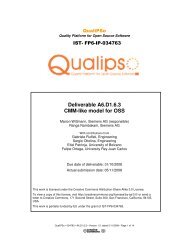WWW/Internet - Portal do Software Público Brasileiro
WWW/Internet - Portal do Software Público Brasileiro
WWW/Internet - Portal do Software Público Brasileiro
You also want an ePaper? Increase the reach of your titles
YUMPU automatically turns print PDFs into web optimized ePapers that Google loves.
IADIS International Conference <strong>WWW</strong>/<strong>Internet</strong> 2010also suggests that there was a strong tendency for people to apply familiar communication practices aftera<strong>do</strong>pting new media.The negative relationship between extraversion and online self disclosure was not expected. This findingsuggests that introverted participants disclosed more intimate personal experience on their blogs than theirextraverted peers. This trend may indicate a social compensation effect in that writing on blogs allowsintroverted people to overcome barriers that had prevented them from talking about themselves. Specifically,the lack of social presence of the receivers and the asynchronous nature of blogs may help some bloggersreveal more online. When posting on blogs, authors <strong>do</strong> not have direct exchange with their readers. The lowlevel of audience social presence should reduce social anxiety for introverted bloggers and allow them to feelmore comfortable writing about personal matters. In addition, blog communication is asynchronous. Unlikein face-to-face conversations, bloggers <strong>do</strong> not immediately face possible negative feedback such as rejectionor disapproval. As a result, disclosing on blogs allows for extra time to handle unpleasant responses andreduces the demand for sophisticated social and communication skills. Together, the unique mediacharacteristics of blogs create a compensating environment for introverted bloggers and facilitate their selfdisclosure.However, it should be noted that this negative relationship between extraversion and blog self disclosurewas not observed in the bivariate correlation analyses. This association only occurred in the regressionmodel after controlling for demographic variables and face-to-face self disclosure tendency. It suggests thatonly when comparing their extraverted counterparts in the same demographic groups and with similar levelsof face-to-face self-disclosure, introverted bloggers reported relatively higher levels of online self disclosure.Another unexpected finding was the positive association between perceived identifiability and selfdisclosure on blogs. As discussed in the literature review, past research suggested that due to the lack ofassociation with real-life identity, people are more comfortable revealing things about themselves online.However, the findings presented herein suggest the opposite. The more bloggers thought they could beindentified by their audience, the more they disclosed. Considering bloggers’ control over their identityrelatedinformation via the profile page or blog posts, identifiability functioned as an indicator of selfdisclosure tendency. This finding cannot be explained by the social disinhibition effect which is <strong>do</strong>minant inthe literature. Rather, it can be better understood from an interpersonal relationship perspective.In recent years, Web 2.0 applications designed to facilitate social relationships have been gainingtremen<strong>do</strong>us popularity (Lenhart, 2009). Previous studies confirmed that people expanded and maintainedtheir existing social networks using social networking applications (Ellison et al., 2007) as well as blogs(Stefanone & Jang, 2007). A large body of literature supports the notion that self disclosure is essential torelationship development. As relationships become more intimate, so too <strong>do</strong>es the exchange of personalinformation between partners (Altman & Taylor, 1973). From this perspective, posting personal thoughtsand feelings on blogs can be viewed as an effort to enhance social relationships. Also based on this view,offering identity-related information is necessary to receive relationship gains within existing socialnetworks. Following this logic, bloggers’ decisions to make themselves known to their readers signal arelational motivation and this relational motivation drives the bloggers to write more about themselves.Similarly, this relational motivation may also help us understand the lack of a significant effect ofperceived vulnerability. While participants reported a moderately high level of perceived vulnerability(M=5.30, SD=1.73), this concern did not produce a statistically significant influence on bloggers’ onlinedisclosure behavior. One possible explanation is that diary-style bloggers have to make a strategic choicebetween protecting privacy and enhancing relationships when posting on their blogs. A strong motivation tomaintain or develop existing social ties may lead bloggers to weigh prospective relational gains againstpotential privacy risks. As a result, no significant effect of perceived vulnerability was observed.Finally, the post-hoc regression analyses shed some light on within-subject differences between perceivedself disclosure levels on- and offline. The results indicate that female and introverted bloggers tended toopen up themselves more on their blogs than in conversations. These findings support the main analyses.They also suggest that the media effect on self disclosure was systematically different across differentindividual characteristics.In conclusion, the findings provide a number of insights regarding the factors associated with selfdisclosure on public blogs. Demographic factors, personal traits, and perceived context all made independentcontributions to predicting self disclosure on blogs. Specifically, the survey data supported a gender effect aswell as an actor effect of self disclosure tendency. In addition, the negative relationship between extraversionand self disclosure on blogs suggests the media attributes of blogs may contribute by compensating for a lack251




